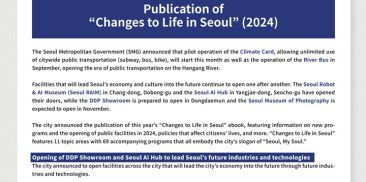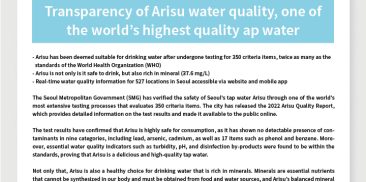特別号
-
2022 April (Vol.71)
-
特別号 登録日投稿者SMG ヒット410

Lowest levels of PM2.5 through seasonal PM management since 2019
The Seoul Metropolitan Government (SMG) began its implementation of seasonal particulate matter (PM) management since 2019 as a measure to control PM output from December to March every year when PM levels are highest. The city intensively implemented 16 reduction measures in four areas—including transport and heating—to reduce PM levels in winter in the past four months, focusing on restricting the traffic of grade 5 vehicles and actively managing business sites that emit air pollutants. As a result of the four-month-long implementation, city officials are estimating a citywide reduction of approximately 130 metric tons of PM2.5 and about 2,500 metric tons of nitrogen oxide (NOx). Seoul saw its lowest average of PM2.5 levels (25 µg/m3) through this year’s seasonal PM management since its first implementation. A year-over-year analysis of this year’s numbers versus Dec. 2018 to Mar. 2019 showed that the average PM2.5 levels reduced by 10 µg/m3 (35→25 µg/m3) and citywide “good air days” (under 15 µg/m3) multiplied by more than threefold (11→38 days). Seoul’s PM2.5 levels recorded 35 µg/m3 prior to the implementation of seasonal PM management, and showed remarkable improvement over the course of three years: 28 µg/m3 (-7 µg/m3 YoY) in the first implementation; 27 µg/m3 (-1 µg/m3 YoY) in the second implementation; and 25 µg/m3 (-2 µg/m3 YoY) in the third implementation. Some major achievements of the city’s PM management policy that contributed to reducing PM levels include decreased number of grade 5 vehicles that violated the city’s restricted traffic regulation (down 84% YoY), supplying of more than 100,000 eco-friendly boilers, and facility inspections conducted targeting business sites. Seoul has made every effort to respond to PM2.5 levels, especially in March when PM2.5 levels are highest, resulting in the lowest-ever at 21 µg/m3 this March, which is down 34% YoY from 32 µg/m3. The SMG will continue its efforts to make Seoul a PM-free city by analyzing the effects of this year’s third seasonal PM management policy, and prepare more effective and reinforced measures for the fourth seasonal PM management coming this December.
Like It
55 人がいいね!と言っています。








